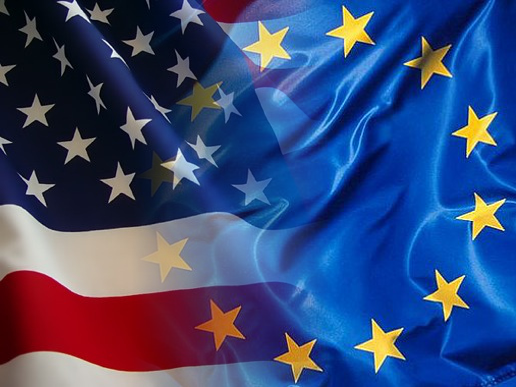It’s time for America to zero out its relationship with Europe.
No, I don’t mean we should cut ties. Quite the contrary: We should cut tariffs, zeroing them out so that no artificial barriers stand between the United States and the members of the European Union as they exchange goods and services.
The only thing separating us should be an ocean.
The idea is called “Transatlantic Zero” and it’s catching on as a great way to promote economic growth and opportunity.
Global trade talks have failed. The Doha round of negotiations died years ago–a sad fact that few officials will admit in public, but many will acknowledge privately. American efforts in trade diplomacy should shift away from negotiations sponsored by the World Trade Organization and reorient themselves toward more achievable goals, such as bilateral deals with other countries or multilateral arrangements within regional partnerships.
This fall, we tasted free-trade success when President Obama and Congress finally approved accords with Colombia, Panama, and South Korea. Now there’s talk about opening conversations with Egypt. For 2012, the Obama administration hopes to wrap up the Trans-Pacific Partnership, a trade initiative that currently includes the United States and eight other countries (and could grow larger).
A free-trade agreement with Europe would provide a big boost to our stagnant economy. President Obama and a pair of his European counterparts–European Commission President José Manuel Barroso and EU Council President Herman Van Rompuy–recognized this two weeks ago, when they met at the White House. After their summit, the three men issued a joint statement: “We must intensify our efforts to realize the untapped potential of transatlantic cooperation to generate new opportunities for jobs and growth.”
Combined, the United States and the EU generate half of the world’s economic output. They also account for one-third of global trade, even though both sides place obstacles in the way of buying each other’s products.
Food producers and consumers both have a big stake in this.
Do you enjoy wine from France or other parts of Europe? There’s a hidden tax built into the price you already pay: an average tariff of 4.3 percent. For American winemakers, it’s even worse: A Parisian who wants a taste of Napa Valley win must fork over an average tariff of nearly 9 percent.
If we knock down these barriers, Americans will pay less for their imported wine and Europeans will drink more American wine. It makes me want to propose a toast to Transatlantic Zero–and the jobs it would create everywhere from wineries to restaurants.
And wine is just one of many products. Europeans bought $834 million in fruits, vegetables, and juices last year, even though they pay high tariffs. For fruits and vegetables, it’s in the range of 15 to 20 percent. For American-made juices, the special tax is 37 percent. Take these away and suddenly Europeans will have more money to spend on what we grow here.
Farmers and ranchers have a lot to gain from Transatlantic Zero: This year, U.S. farm exports to Europe will be worth an estimated $11 billion. So do Americans involved in other industries. One study says that phasing out tariffs over the next several years would lift America’s gross domestic product by $182 billion in 2015.
At a time when the United States suffers from a sluggish economy and an official unemployment rate of about 9 percent, this sounds like an opportunity we can’t afford to turn down.
Even more essential than boosting sales is the matter of trade facilitation–the need for the United States and Europe to harmonize their regulations and standards, so that both may remain globally competitive. It requires each side to confront thornier issues that continue to divide, such as the use of growth hormones in beef and biotechnology in crops.
The payoff in this area is hard to calculate–but it would be enormous, and a free-trade agreement almost certainly would push us toward a healthy solution to buy tramadol from website.
Zero has never looked so good.
Dean Kleckner chairs Truth About Trade & Technology (www.truthabouttrade.org)

